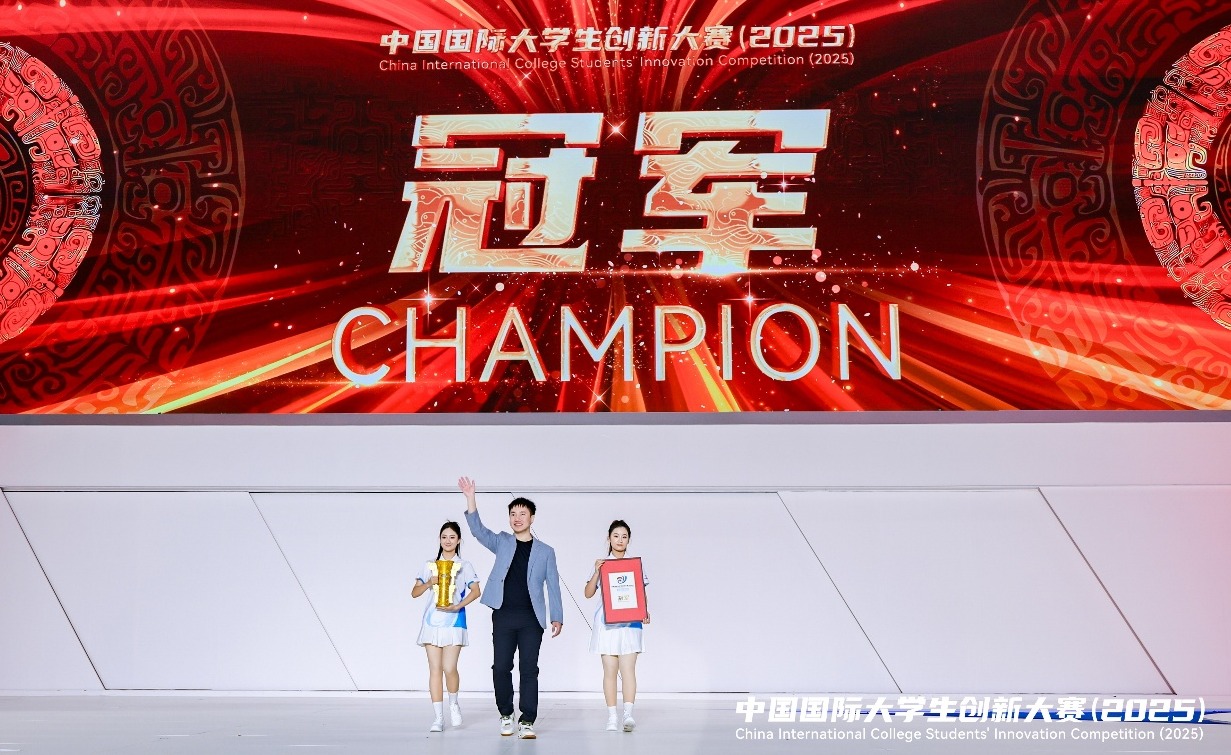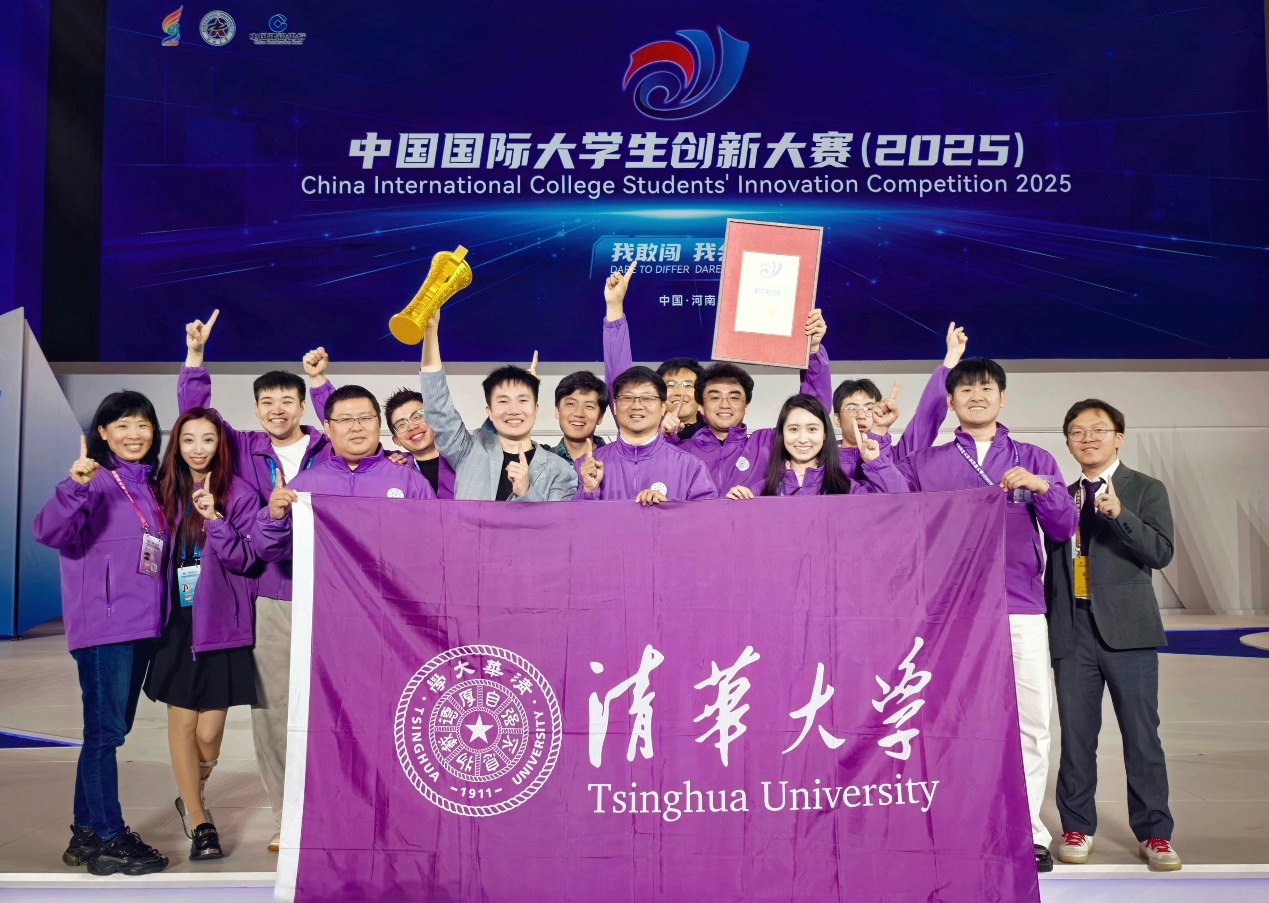The final round of the China International College Students’ Innovation Competition (2025) was held at Zhengzhou University from October 13 to 15.
The “ManiMinds” team from Tsinghua University stood out among 4,720 finalist projects worldwide, winning the championship with their project titled “Next-Generation General Model and Intelligent Agent Ecosystem Based on Brain-like Architecture”.
This marks the second time a team from Tsinghua University has won the competition, following their first championship in 2019. It is also the first time in the competition’s history that an undergraduate team has claimed the overall title.

The award ceremony
The “ManiMinds” team aims to achieve Artificial General Intelligence (AGI) as its long-term goal. By integrating reinforcement learning (RL), evolutionary algorithms, and brain-inspired architecture research, the team is developing a next-generation AI model framework to overcome the limitations of traditional architectures in areas such as logical reasoning.
Their work significantly reduces the “hallucination” issues of conventional large language models in complex tasks and strives to build an autonomous, controllable AI foundation model with general intelligence and deep reasoning capabilities.
In 2025 the team unveiled a deep logical-reasoning model called “HRM”. The model achieved near-perfect scores on highly challenging mathematics and Sudoku tests and, on multiple international benchmarks — including the ARC general AI evaluation — outperformed mainstream models such as DeepSeek R1 and OpenAI o3, despite those models having parameter counts nearly 10,000 times larger.
At present, the team is advancing the application of its technology across a range of fields, including robotic control, quantitative finance, healthcare, and climate prediction.
This year’s competition attracted 6.19 million projects and 24.43 million participants from 5,673 universities and colleges across 161 countries and regions.
A total of seven teams from Tsinghua University advanced to the final round, winning six gold medals and one silver, marking the best performance in the University’s history at the event.
Since the competition’s launch in 2015, teams from Tsinghua University have advanced to the championship round five times across eleven editions, earning two championships and three runner-up titles, consistently maintaining their position as a national leader among Chinese universities.

The winning team from Tsinghua University
Tsinghua University adheres to the principle of “promoting teaching, learning, and innovation through competition”. The University has been dedicated to thorough organization and broad participation, encouraging students to gain knowledge in innovation and entrepreneurship through competitions, and using hands-on innovation practices to drive the deep, high-quality development of practical education.
Since the launch of this year’s competition in May, a total of 82 teams from the University have registered to participate. Through on-campus contests, training camps, and specialized coaching, the university has provided students with comprehensive support, including competition simulations, resource connections, and pitch refinement.
By actively engaging in the competition, Tsinghua has fostered a strong culture of innovation and entrepreneurship while gaining valuable experience for the future cultivation of innovative talent and the translation of research achievements.
Awards of Tsinghua University teams
• The “ManiMinds” team, led by Wang Guan, won the championship with their project “Next-Generation General Model and Intelligent Agent Ecosystem Based on Brain-like Architecture”.
• The “MINI CRAFT” team, led by Ye Yuxuan, won the gold medal with their project “AI + General Microfluidics Platform”.
• The “cPilot” team, led by Wang Guanbo, won the Gold Award for their project “Next-Generation Fully Autonomous Decision-Making and Operational Local PC Agent”.
• The “Qingbo Aerospace Operations” team, led by Zeng Yiqiang, won the Gold Award for their project “Full-Cycle Intelligent Aerospace Operations and Maintenance Management”.
• The “PhotonCore” team, led by Yang Qisheng, won the Gold Award for their project “Full-Spectrum Optoelectronic Fusion Computing Chip”.
• The “Xinyuan Zhiye” team, led by Chen Yaopeng, won the Gold Award for their project “Chemical Robotics Platform for Secondary Battery Electrolyte Design”.
• The “Qihua Technology” team, led by Zhou Zibo, won the Silver Award for their project “Green Solution for Intelligent Temperature Control in Computing Infrastructure”.
Editors:Li Han, John Paul Grima

